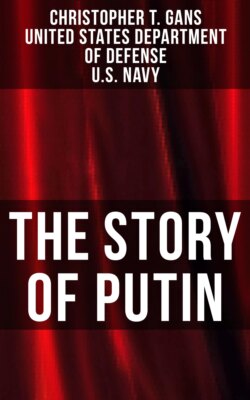Читать книгу The Story of Putin - United States Department of Defense - Страница 9
На сайте Литреса книга снята с продажи.
2. Putin’s Hybrid-Authoritarian Machine
ОглавлениеTable of Contents
There remains a general consensus that Putinist Russia, while not a full-fledged authoritarian state, certainly is not a liberal democracy either. Russia operates as an authoritarian-democratic system, whether referred to as a “hybrid regime,” “electoral authoritarianism,” “competitive authoritarianism,” or even “overmanaged democracy.” Marie Mendras effectively sums up many writers’ interpretations in referencing “2-sided behavior” based on authoritarian political methods while claiming to be a democracy. Dmitri Trenin similarly calls Russia an authoritarian state with democratic institutions.1 Stephen Kotkin provides a great summation to this consensus about the general nature of Russian government and politics: “a ramshackle authoritarian system with some democratic trappings.”2
Some attribute Putin’s power-base and hold on power with the elites in Russia, exemplified by the works of Karen Dawisha and Charles Clover. Dawisha asserts that the Putin inner circle of oligarchs and businessmen within the government have supplanted state interests with their own personal interests; Clover claims that the corrupted elites’ sway over Putin is based on their non-interference in politics in return for bi-lateral favors.3 Others consider the Russian public at large a significant power-base for Putin. Timothy Colton and Henry Hale argue that Putin does maintain a broad public appeal with the electorate, given that his election victories have not been based solely on fraud.4 Public polling for the duration of Putin’s time in power have borne witness to consistent majorities, often as high as 70% favorability ratings for the strong-man.5 Whether beholden to the societal elites, the public, or both, Putin’s grip on power does remain partially contingent on the acquiescence of these segments of society. A politician that must still appeal to his populace needs to demonstrate some level of commonality with that populace: shared goals, values, beliefs, etc. Anti-Americanism represents an easy way to show commonality with an electorate at risk of becoming disenchanted with Putin’s authoritarian revival. Putin can thereby garner the domestic political benefit of their support.
Whatever Putin’s government and political system is called and regardless of how secure his position is deemed to be, the system he runs depends on him. Regardless of the metaphor employed, Putin is the key, the lynchpin, the apex (etc.) of the current Russian political organism. Because the structure relies on his “manual control,” there is a consensus that his absence or departure would make the system’s survival tenuous.6
1 Dmitri Trenin, Post-Imperium: A Eurasian Story (Washington DC: Carnegie Endowment for International Peace, 2011), 72.
2 Stephen Kotkin, “Russia under Putin: Toward Democracy or Dictatorship?,” Foreign Policy Research Institute, March 2007, http://www.fpri.org/enotes/200703.kotkin.russiademocracydictatorship.html.
3 Karen Dawisha, “Is Russia’s Foreign Policy that of a Corporatist-Klepotocratic Regime?,” Post-Soviet Affairs 27, no. 4 (2011), 332; Charles Clover, “Who Runs Russia?,” Financial Times, December 16, 2011, http://www.ft.com/intl/cms/s/2/ b4b5a2aa-26cb-11e1–9ed3–00144feabdc0.html.
4 Timothy Colton and Henry E. Hale, “The Putin Vote: Presidential Electorates in a Hybrid Regime,” Slavic Review 68, no. 3 (Fall 2009): 502, http://www.jstor.org/stable/25621652.
5 “Russian Public Opinion 2010 — 2011” (Moscow: Levada Analytical Center, 2012), 11.
6 Nikolai Petrov, Masha Lipman, and Henry Hale, “Overmanaged Democracy in Russia: Governance Implications of Hybrid Regimes,” Carnegie Papers, no. 106 (Washington DC: Carnegie Endowment for International Peace, February 2010), 26.
